10 Gut-Friendly Baking Swaps That Actually Taste Good (+ Recipes To Try)
Gut-friendly baking doesn’t have to mean bland, dry, or overly complicated. These 10 easy baking swaps (with recipes!) support digestion, blood sugar balance, and inflammation reduction — without sacrificing flavor or texture.
Gut health has been quite the hot topic recently (and in my life), and for good reason… gut health is so important for your overall health. Your gut is called your second brain because it handles so much more than JUST digestion — mood, cognitive function, metabolism, pain sensitivity, hormones, and sleep are all affected by your gut. Even your immune system is largely dependent on the function of your gut.
The types of food we eat directly impact the health and function of our microbiome (aka our gut bugs), and how our gut runs and affects our full body health.
So what foods are important to eat, and which should we avoid more?
Food and the Gut Microbiome:
Fiber is incredible for your gut health. Foods that are rich in dietary fiber, like fruits, veggies, and whole grains, act as prebiotics, which feed the good bacteria in your gut.
Fermented foods like yogurt, kefir, sauerkraut, and kimchi contain probiotics, which are the good bacteria that can help balance your gut microbiome.
Now to avoid? Diets that are super high in processed foods, sugar, and unhealthy fats can feed the “not so good” bacteria and negatively impact your gut microbiome, leading to inflammation and digestive issues (now I’m not saying you can NEVER eat a bag of chips again, but these are the foods that you want to eat more mindfully as a rare treat, not as a rule, because foods truly can alter the composition and function of the gut microbiome, impacting your digestion, immunity, and even appetite).
Now for the fun part! Because your gut deserves cookies too!!!
Oat Flour Instead of White Flour
Oat flour is one of the most versatile, gut-friendly flours out there. It’s whole grain, gluten-free naturally gluten-free (check if certified), and super gentle on digestion. It’s made from just ground oats, and gives your baked goods a soft, fluffy texture without needing gums or starches. It’s also way gentler on digestion than most gluten-free blends, which are often filled with fillers, corn, or rice flours.
Use it in muffins, pancakes, cookies, and bars.
Why it’s gut-friendly:
Rich in soluble fiber (beta-glucan) to support motility and satiety
Naturally supports blood sugar balance and digestion
No gums, no binders
Comforting and easy to digest for most, even during gut healing protocols
Try it in: Peanut Butter White Chocolate Protein Cookies
2. Date Sugar or Date Syrup
Dates are one of the most functional sweeteners for gut-friendly baking, they’re rich in fiber, potassium, and a more gut-nourishing sweetener option. Unlike refined sugar, dates come with their own digestive support built in, whether you’re blending whole Medjool dates into caramel, using date sugar / syrup for cookies, or choosing date-sweetened chocolate chips, you’re getting more than just sweetness — you’re getting fiber, minerals, and real-food energy.
Why they’re gut-friendly:
Naturally high in soluble fiber to support motility and microbiome balance
Rich in potassium, iron, and magnesium
Lower glycemic than white sugar when eaten whole or minimally processed
Prebiotic benefits that support healthy gut flora
Try it in: Chocolate Tahini Gut Health Energy Balls
3. Coconut Milk or Cashew Milk for Dairy
Dairy can be inflammatory for sensitive guts. These swaps are creamy, satisfying, and bake well.
Coconut milk is one of the best swaps for traditional milk or cream in baking — especially if you’re looking for something rich and creamy that won’t disrupt digestion. Full-fat canned coconut milk adds structure and moisture to batters, keeps things tender, and works beautifully in both baked and no-bake treats.
It’s especially helpful for anyone dealing with dairy sensitivity, inflammation, or histamine issues.
Why it’s gut-friendly:
Dairy-free and less inflammatory for sensitive guts
Rich in medium-chain triglycerides (MCTs) for quick, clean energy
Adds moisture without excess sugar or gums
Naturally satiating — helps balance hunger and blood sugar
Try it in: Chocolate Fudge Sheet Cake
4. Maple Syrup Instead of Corn Syrup
Maple syrup is one of the most reliable swaps in gut-friendly baking, it’s unrefined, mineral-rich, and adds depth without the blood sugar crash. Unlike white sugar, it’s absorbed more slowly, making it easier on digestion and energy levels. It also brings a cozy, caramel-like sweetness that works beautifully in cakes, cookies, blondies, and sauces.
Why it’s gut-friendly:
Naturally lower on the glycemic index than cane sugar
Contains trace minerals like zinc and manganese for blood sugar support
Easier to digest for many, especially when avoiding refined sugars
Liquid form keeps baked goods extra soft and moist
Try it in: Cookie Dough Tahini Caramel Bars
4. Banana for Sugar / Eggs / Oils
Banana is a classic gut-friendly swap that adds moisture, natural sweetness, and fiber to your bakes (There’s a reason banana bread exists), all while cutting down on added sugar and inflammatory fats. It’s especially perfect in muffins, snack cakes, and cookies where a soft texture is the goal.
Flavor-wise, it plays best with chocolate, cinnamon, nut butter, or vanilla — and if you don’t overdo it, the banana taste stays subtle.
Why it’s gut-friendly:
Naturally sweet with prebiotic fiber
Rich in potassium to support digestion and electrolyte balance
Easier on blood sugar than white sugar
Moisture-dense, helps with softness in gluten-free baking
Adds sweetness, minerals, and fiber without needing added sugar
Try it in: Healthy Ice Cream Slice
5. Dark Chocolate or Date-Sweetened Chips
Keeps the treat vibe while cutting sugar. Your gut (and skin) will thank you. If you’re trying to lower your sugar load but still want a rich, indulgent dessert, dark chocolate is the easiest upgrade. Look for 85%+ cacao bars or baking chips with just a few clean ingredients (I love HU Kitchen), or go for date-sweetened chips to keep sweetness naturally fiber-rich and blood sugar-friendly.
They melt just as beautifully, add depth, and actually make your treats taste better, not just “healthier.”
Why they’re gut-friendly:
Less sugar, more cacao = less inflammation
Naturally rich in magnesium + polyphenols that support gut lining + brain health
Date-sweetened chips offer prebiotic fiber and fewer blood sugar spikes
Helps you feel satisfied faster (less binge-y, more balanced)
Try it in: Cookie Dough Ice Cream Squares
6. Tahini for Nut Butters or Fats
Tahini (aka ground sesame seed paste) is anti-inflammatory, mineral-rich, and adds a unique depth of flavor. It’s one of the most underrated baking ingredients. It brings a naturally rich, slightly nutty flavor that cuts sweetness in the best way, and it’s a perfect swap for peanut butter, almond butter, or even oil in certain recipes. It adds moisture, healthy fats, and just enough structure to hold things together without weighing it down.
It shines in no-bakes, brownies, cookies, and anything with caramel, chocolate, or dates.
Why it’s gut-friendly:
Packed with anti-inflammatory fats that support hormone + gut balance
Naturally mineral-rich, especially calcium, magnesium, and iron
Lower in mold risk than some nut butters
Creamy but light and makes treats feel satisfying, not heavy
Try it in: Tahini Caramel Date Banana Bark
7. Matcha Instead of Cocoa or Espresso Powder
Matcha is more than a trendy add-in — it’s a functional, antioxidant-packed swap that supports focus, digestion, and nervous system calm. It gives baked goods a subtle earthy sweetness and natural color, and it’s especially good for those avoiding coffee or heavy caffeine.
It doesn’t behave exactly like cocoa in recipes, but in energy balls, cakes, and muffins, it adds depth without bitterness. Bonus: matcha pairs beautifully with vanilla, white chocolate, citrus, and pistachio.
Why it’s gut-friendly:
Contains L-theanine to calm the nervous system
Lower in caffeine than coffee — less digestive stimulation or stress
High in EGCG, a powerful antioxidant for gut lining health
Anti-inflammatory and gently energizing
Try it in: Pistachio Matcha Protein Balls
8. Olive Oil Instead of Butter or Canola Oil
Olive oil is one of the most underrated baking ingredients. It’s anti-inflammatory and gut-supportive.
It adds richness, moisture, and depth to baked goods — especially brownies, cakes, and muffins — without relying on inflammatory seed oils or dairy. It’s also one of the most gut-friendly fats out there, thanks to its anti-inflammatory properties and gentle digestibility.
If you’re used to coconut oil or butter in your bakes, try extra virgin olive oil in recipes that need a little density and smooth moisture. It works especially well in chocolate-forward or spiced treats.
Why it’s gut-friendly:
Rich in polyphenols that support a healthy gut lining
Anti-inflammatory and soothing on digestion
Helps absorb fat-soluble vitamins in nutrient-dense bakes
No dairy, no gut disruption, and surprisingly neutral in flavor when baked
Try it in: Gluten-Free Fudgy Chocolate Brownies
9. . Applesauce for Oil
Unsweetened applesauce is one of my go-to baking swaps, it keeps things moist, adds natural sweetness, and cuts down on both added sugar and inflammatory oils. It works best in soft-baked recipes like muffins, snack cakes, and cookies where a little added fiber and sweetness are a bonus.
The key? Use it in recipes where you don’t need a crispy edge. It shines in tender, fluffy bakes and blends right into the background as far as flavor goes.
Why it’s gut-friendly:
Adds prebiotic fiber to support good gut bacteria
Naturally sweet, so you can reduce added sugars
Moisture-rich without the heaviness of oil
Easier to digest than dairy or butter-based batters
Try it in: Vanilla Blueberry Crunch Muffins
10. Coconut Butter for Butter or Oil
Coconut butter isn’t the same as coconut oil, it’s made from the whole coconut flesh, so it contains lots of fiber, a natural sweetness, and healthy fats all in one. It melts like frosting when warm, hardens beautifully when chilled, and brings a satisfying richness that feels indulgent without dairy or oil.
It works especially well in no-bake desserts, fillings, frostings, and fudge layers because it firms up when cold (similar to chocolate), which makes it a perfect base for gut-friendly treats that don’t rely on heavy oils or refined sugars.
Why it’s gut-friendly:
Naturally sweet, so you can reduce added sugars
Rich in lauric acid (antimicrobial, digestion-supportive)
Full of MCTs for steady energy without a blood sugar spike
Contains a little fiber, unlike pure oil
Gentle on most sensitive guts (if tolerated)


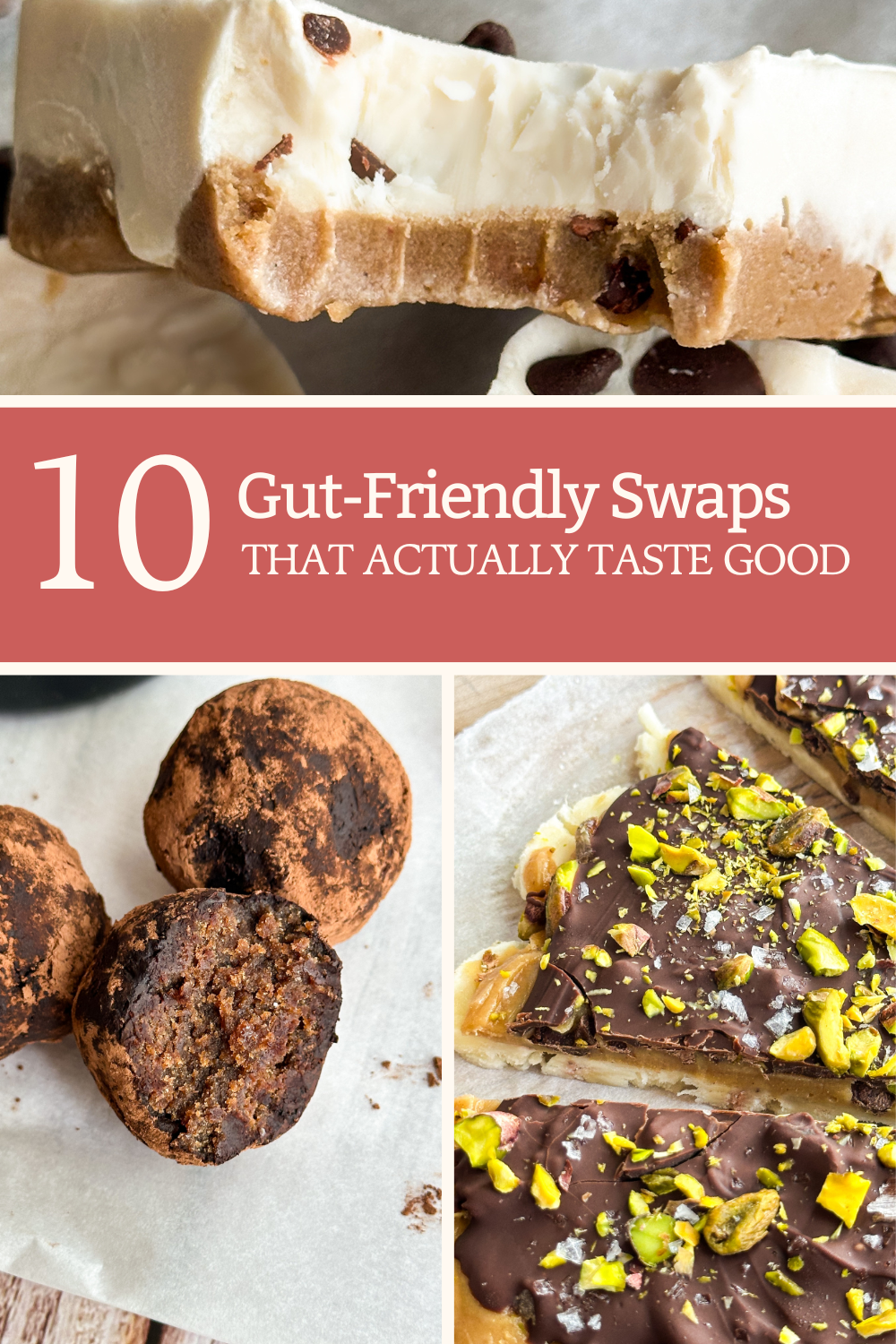
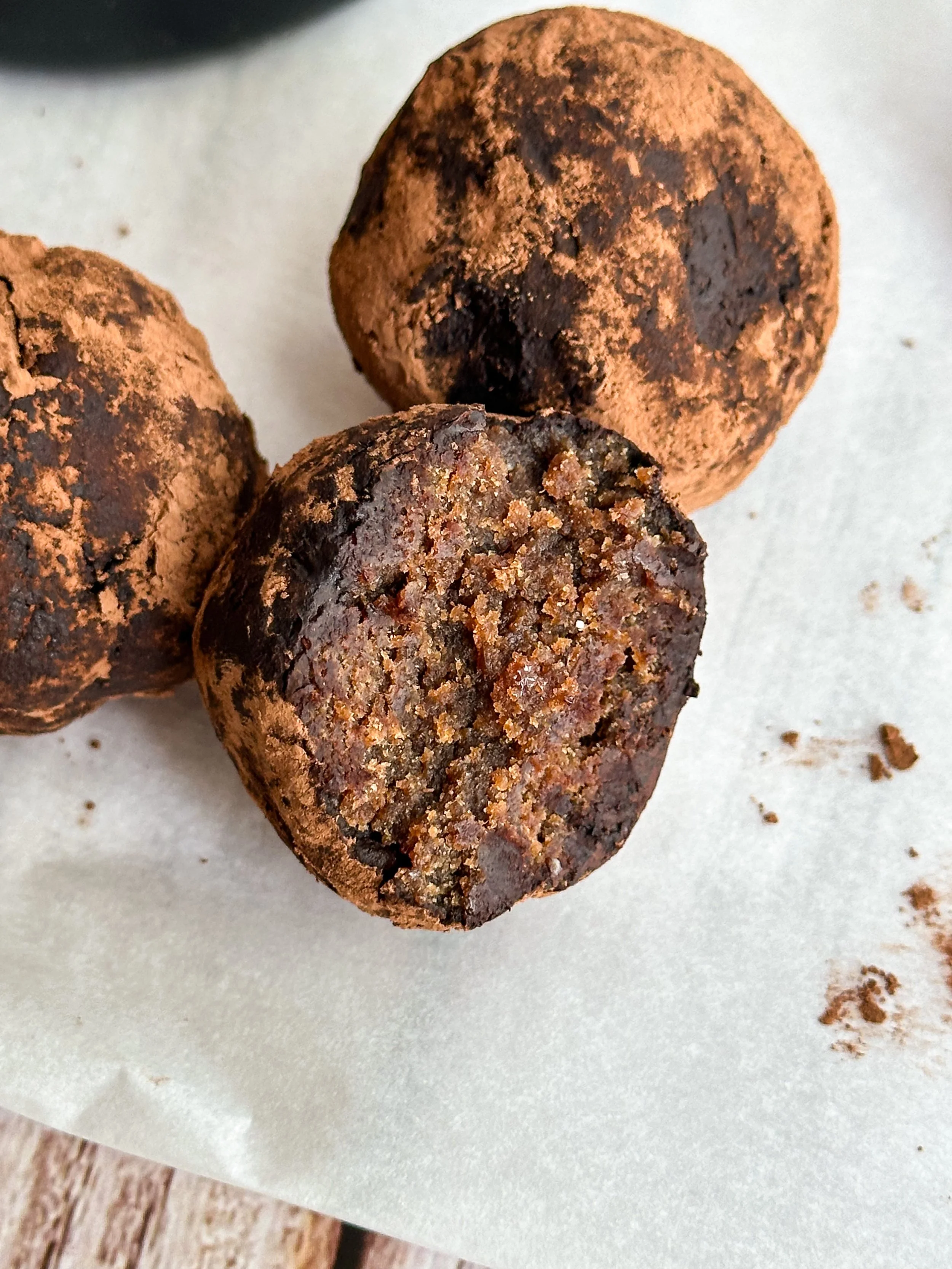
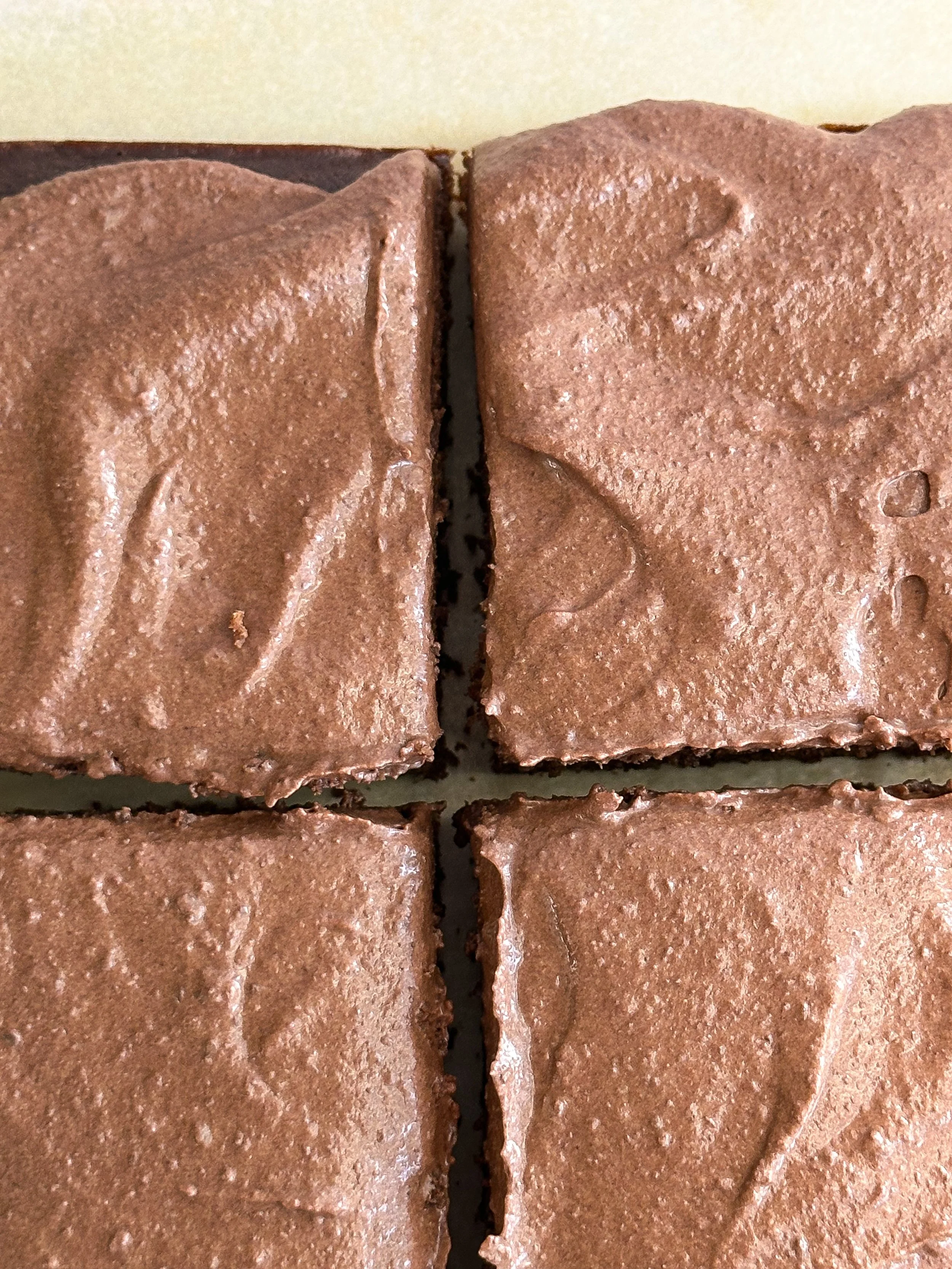



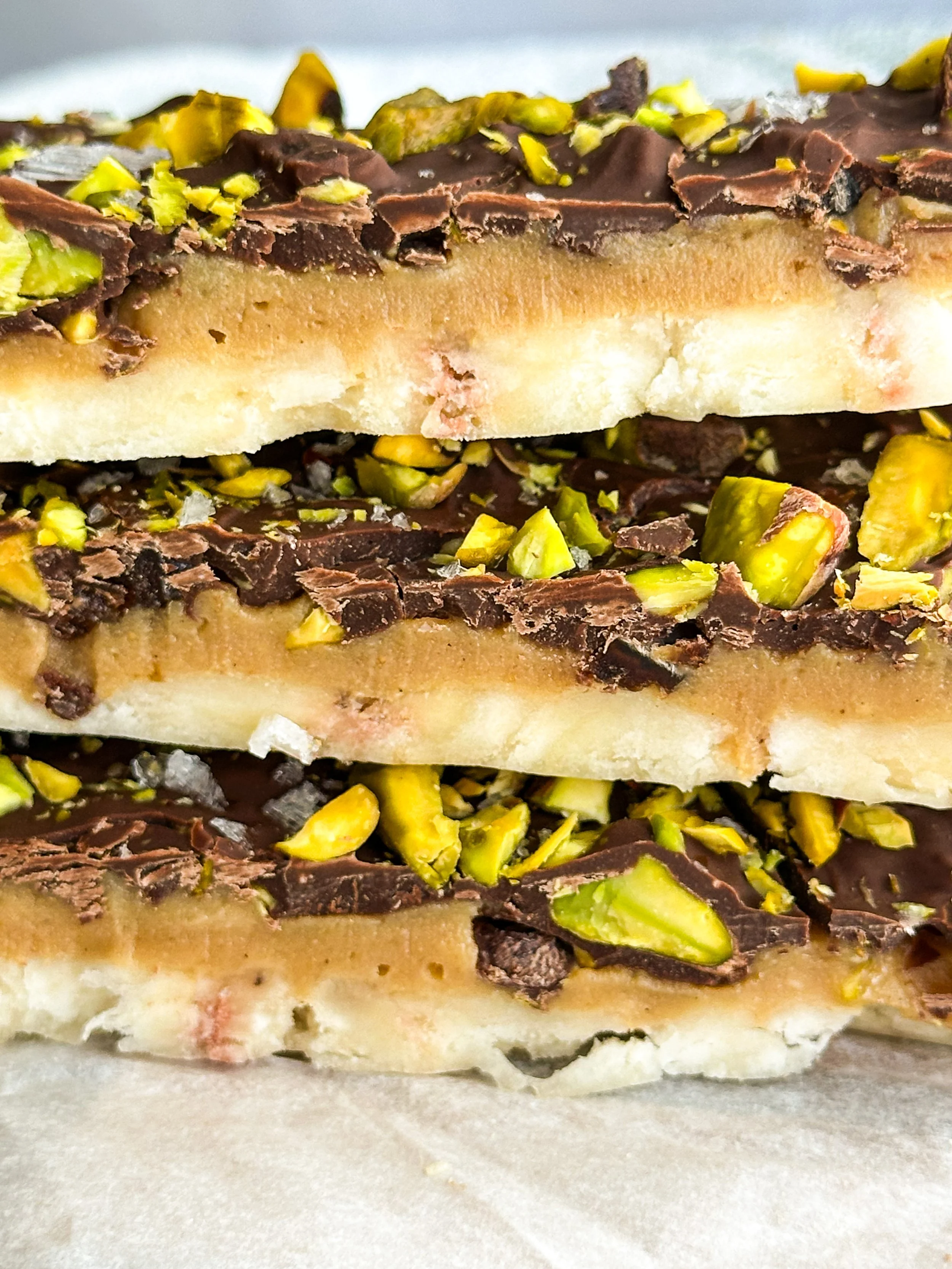

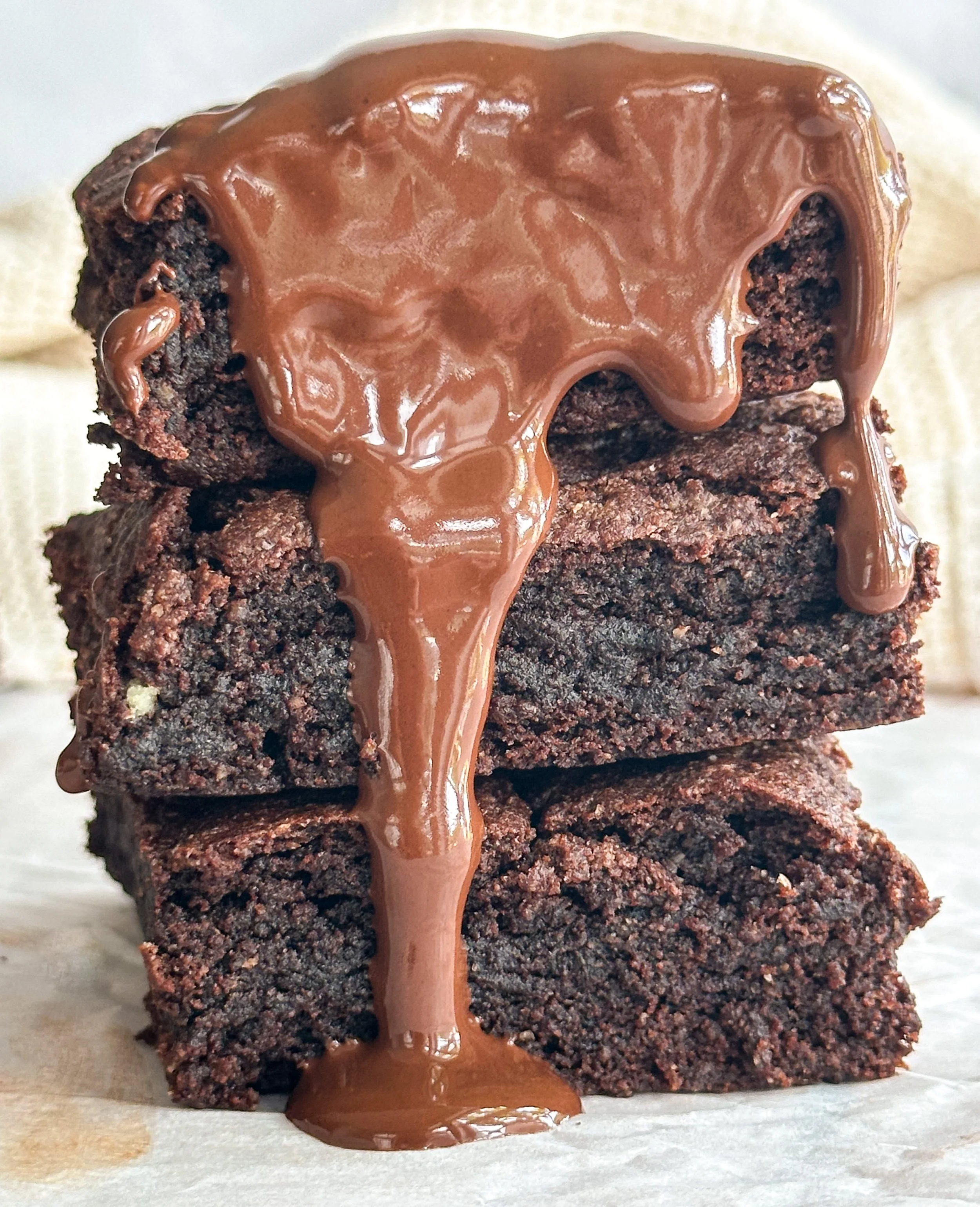

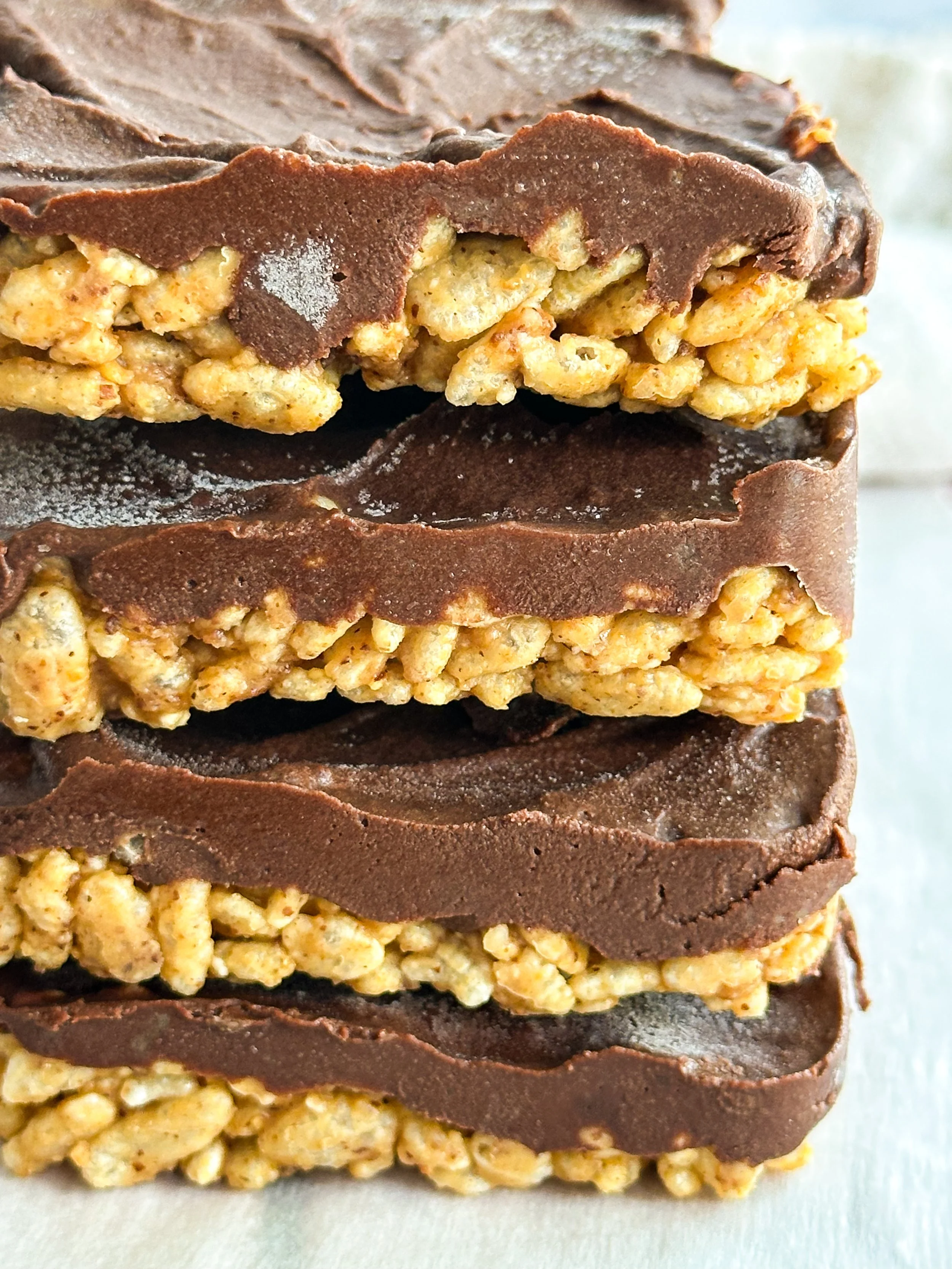
These Peanut Butter White Chocolate Protein Cookies are soft, sweet, and packed with 10g+ protein per cookie. Made with just 5 ingredients, they’re gluten-free, dairy-free, refined sugar-free, and ridiculously easy to bake.